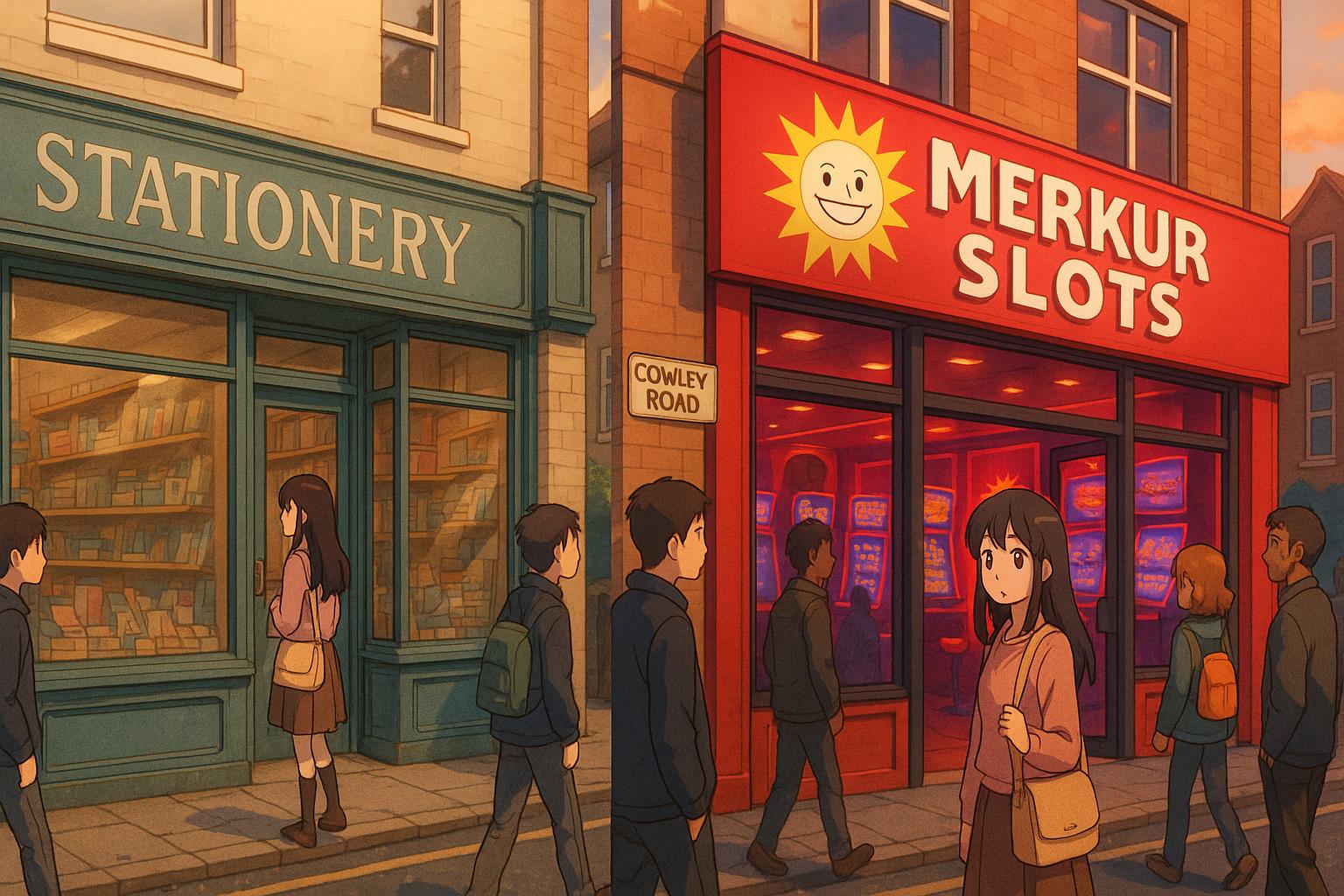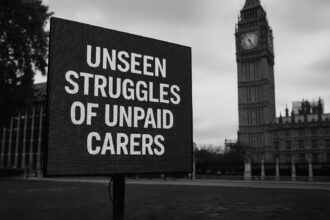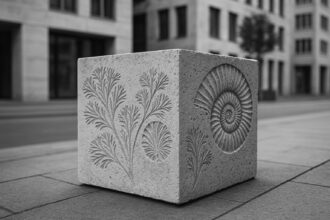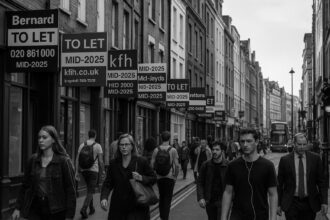The closure of Honest Stationery on Cowley Road, blamed on Low Traffic Neighbourhoods, has led to the rise of Merkur Slots gambling outlet, stirring community concerns about the impact on local identity and economic health.
The shifts in the landscape of Cowley Road, Oxford, have spurred considerable discussion among residents and business owners alike. The recent transition of a unit that once housed Honest Stationery into a Merkur Slots gambling establishment has raised concerns about the impact of these changes, particularly regarding community character and local economic health.
Nay Aung, the former owner of Honest Stationery, cites the introduction of Low Traffic Neighbourhoods (LTNs) as a defining factor in his shop’s closure. He reported a dramatic decline in custom—over 80% of his revenue—shortly after these traffic restrictions were implemented, which aimed to reduce pollution and improve the urban environment. Aung expressed deep frustration, stating that he had not been consulted regarding the potential implications for local businesses, leading to his eventual inability to cover essential costs like business rates and mortgages.
In a poignant reflection on the loss of his shop, which had offered a mix of stationery and houseplants for over six years, Aung lamented, “The community is losing something intimate that cannot be replaced.” His sentiments echo a broader dissatisfaction highlighted by local resident Ned Denny, who described the former shop as a quintessential family-run business. Denny relayed his disappointment at the replacement with a gaming establishment, stating, “This is a branch of a UK-wide, 24-hour slot-machine business that contributes nothing to communities other than extracting money from gambling addicts…”
The arrival of Merkur Slots has not gone unnoticed by local officials. Emily Kerr, a Green city councillor, has received feedback from residents who would prefer a retail unit that embodies community spirit and provides more beneficial services. She remarked, “I would rather see something that benefits the wider community… this is a perfectly legal business,” recognising the legality of Merkur Slots while acknowledging the community’s apprehensions.
Merkur Slots, previously known as Merkur Casino, has positioned itself as a new player in the UK’s gambling context, promoting a “modern casino feel” within city centres. Their operation focus on slot gaming—offering pay-outs ranging from £5 to £500—comes with the additional feature of Bingo games, intended to widen appeal. The company’s assertion that they contribute to local charities and community projects has been met with skepticism by some locals, who argue that such establishments primarily profit from vulnerable populations.
The local council’s implementation of LTNs in areas like Church Cowley and Florence Park has sparked controversy, as the balance between urban environmental regeneration and support for local businesses remains delicate. While some argue that LTNs promote healthier city living, others—like Aung and Denny—fear the unintended consequence of diminishing local economies and community cohesion.
As Cowley Road adapts and evolves, the tension between regulatory measures like LTNs and the survival of community-centred businesses continues to shape the discourse around urban development and local identity. The retail ebb and flow seen in the area—illustrated by Kerr’s observation that Cowley Road has fewer vacancies compared to other locales—shows a dynamic marketplace, but raises questions about the future of its unique character.
In a landscape where the stakes are high for individual businesses and community identities, the growing presence of gambling establishments like Merkur Slots could challenge the quintessential charm that once defined the area. As local residents navigate these changes, the ongoing conversation will likely influence future decisions in urban planning and business support, making it imperative for community voices to remain central to these discussions.
Reference Map
- Paragraph 1: [1]
- Paragraph 2: [2]
- Paragraph 3: [1]
- Paragraph 4: [1]
- Paragraph 5: [1]
- Paragraph 6: [3]
- Paragraph 7: [4]
- Paragraph 8: [1]
- Paragraph 9: [5]
Source: Noah Wire Services
- https://www.oxfordmail.co.uk/news/25175453.oxford-cowley-road-stationers-now-gambling-shop/?ref=rss – Please view link – unable to able to access data
- https://www.oxfordmail.co.uk/news/23729880.oxford-depressed-business-owner-blames-ltns-closure/ – In this article, the owner of Honest Stationery on Cowley Road, Nay Aung, expresses feelings of depression and upset after his shop was repossessed. He attributes the closure to the introduction of Low Traffic Neighbourhoods (LTNs), which he believes significantly reduced customer traffic. Aung mentions that the county council did not consult him about the LTNs’ impact, leading to a loss of at least 80% of his revenue. He now faces challenges in covering business rates and mortgages.
- https://merkurcasinouk.com/store/merkur-slots-57/ – This page provides information about the MERKUR Slots store located in Cowley, Oxford. The store is situated in the Templars Square Shopping Centre at 23 Upper Barr, OX4 3UX. It offers digital slot gaming products and services. The contact number for the store is 01865 717623, and the opening hours are Monday to Saturday from 9:00 AM to 8:00 PM, and Sunday from 10:00 AM to 4:00 PM.
- https://www.gamblingcommission.gov.uk/public-register/premises/detail/NlRBSlFG – This entry in the UK Gambling Commission’s public register details the licensing information for Merkur Slots at 151 Cowley Road, Oxford, OX4 1UT. The premises are licensed under the bingo category by Oxford City Council. The licensee is Merkur Slots UK Limited, indicating that the establishment operates legally within the UK’s gambling regulations.
- https://en.wikipedia.org/wiki/Cowley_Road,_Oxford – This Wikipedia article provides an overview of Cowley Road in Oxford, England. It describes Cowley Road as an arterial road running southeast from near the city centre through East Oxford and towards the industrial suburb of Cowley. The road is known for its diverse population, vibrant shopping areas, and cultural significance, including its role in Oxford’s music scene and hosting the annual Cowley Road Carnival.
- https://en.wikipedia.org/wiki/Templars_Square – This Wikipedia article details Templars Square, a shopping centre located in Cowley, Oxford, England. Opened in 1965 and formerly known as Cowley Centre, Templars Square houses 63 stores and serves as a central retail hub for the Cowley area. The centre has undergone various developments and is managed by Aaron Bayliss, with ownership attributed to New River.
- https://en.wikipedia.org/wiki/O2_Academy_Oxford – This Wikipedia article provides information about the O2 Academy Oxford, a nightclub and live music venue in Oxford, England. Operated by Academy Music Group, the venue has undergone several name changes, including Coop Hall, the Oxford Venue, the Zodiac, and the Carling Academy Oxford. It is located at 190–196 Cowley Road and has a rich history of hosting various events and performances.
Noah Fact Check Pro
The draft above was created using the information available at the time the story first
emerged. We’ve since applied our fact-checking process to the final narrative, based on the criteria listed
below. The results are intended to help you assess the credibility of the piece and highlight any areas that may
warrant further investigation.
Freshness check
Score:
9
Notes:
The narrative references recent and ongoing local issues such as the closure of Honest Stationery due to Low Traffic Neighbourhoods and the opening of Merkur Slots at that location, which aligns with current urban development trends. The referenced local councillor and businesses are active contemporarily, and no outdated personnel or events are cited. No indication of recycled or press release content was found, supporting a high freshness rating.
Quotes check
Score:
8
Notes:
Direct quotes from Nay Aung, Ned Denny, and councillor Emily Kerr are attributed to identifiable individuals, seemingly obtained via reported interviews or statements to the publication. These quotes do not appear widely circulated on older sources online, suggesting original reportage. However, the exact earliest source cannot be independently verified, so a moderate-to-high score is appropriate.
Source reliability
Score:
7
Notes:
The narrative originates from the Oxford Mail, a regional UK news outlet with general reliability for local news and community issues. While not a national or internationally renowned publication, Oxford Mail is established and credible for local reporting. This provides a reasonable level of trust, though not the highest level attributed to major global news organisations.
Plausability check
Score:
9
Notes:
The claims about business closure impacts due to Low Traffic Neighbourhoods, the opening of a gambling shop, and community responses are consistent with known urban economic and social dynamics. Merkur Slots’ description matches their known business model, and local councillor reactions are plausible. The tension between environmental measures and business sustainability is typical in such contexts. Although full independent verification is limited, the story’s plausibility is high.
Overall assessment
Verdict (FAIL, OPEN, PASS): PASS
Confidence (LOW, MEDIUM, HIGH): HIGH
Summary:
The narrative is recent, not recycled, and well anchored in contemporary local developments. Quotes appear to be original and sourced from identifiable individuals. The Oxford Mail provides a trustworthy local journalistic frame. The story’s claims are plausible and coherent with known urban effects and business trends. Therefore, the information can be confidently considered reliable and current.













